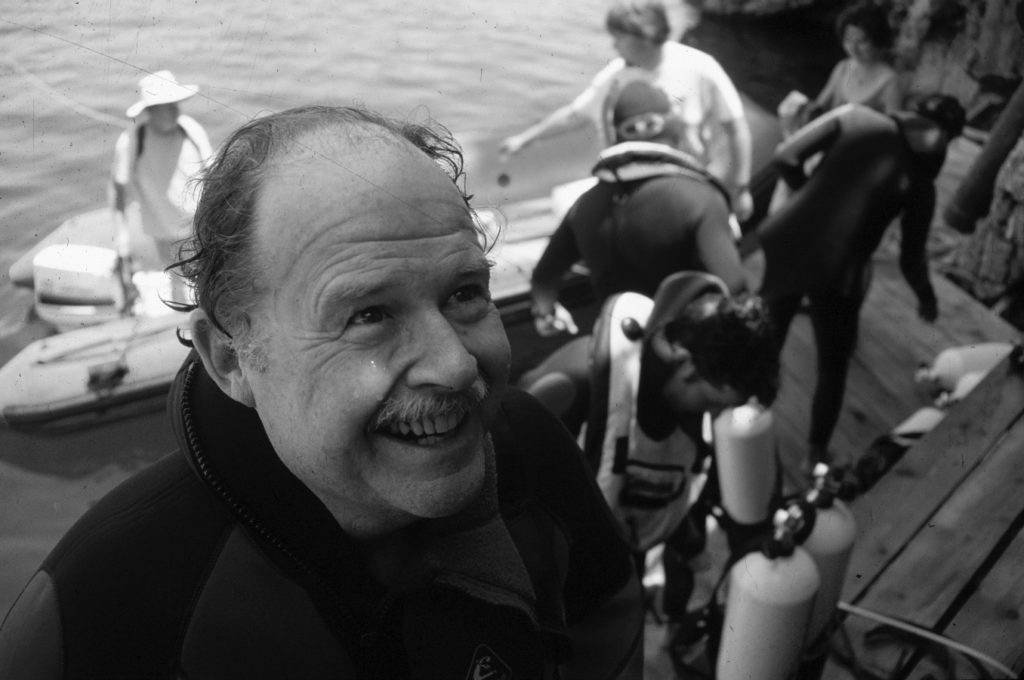March 11, 2021

It is with great sadness that we share the news of George Bass’ passing, and offer our deepest condolences to his family, friends, and colleagues. George passed away on March 2, 2021, in College Station, Texas.
George F. Bass was well known to many as a pioneer in the field of nautical archaeology. Fascinated with archaeology as an undergraduate, George’s M.A. in Near Eastern Archaeology was a precursor to his later work in nautical archaeology, which led to his PhD. Following a two-year term at the American School of Classical Studies at Athens, where he excavated at Gordion, and two years of military service in South Korea, George’s life changed with the discovery of what was at the time the world’s oldest shipwreck, a Bronze Age wreck from, c. 1200 BC.
With support from the University of Pennsylvania’s Museum of Archaeology and Anthropology, Bass was selected by the museum’s director, Rodney Young, to represent the museum and co-direct the excavation of the wreck, which lay off the coast of Turkey. Before departing, George took classes on diving at the local YMCA, but arrived with no practical underwater experience. The collaboration of George, Joan du Plat Taylor, Honor Frost, Peter Throckmorton; with skilled divers Frederic Dumas and Claude Duthuit resulted in the Gelidonya site excavation being the first to completely archaeologically excavate an ancient shipwreck from the sea floor.
After receiving his Ph.D. from the University of Pennsylvania, George embarked on a long career in nautical archaeology. He was the founding President of the Institute of Nautical Archaeology, the founder of the Nautical Archaeology Program at Texas A&M University, where he held the George T. and Gladys H. Abell Chair in Nautical Archaeology, and a prolific author. Among his many awards were the AIA Gold Medal for Distinguished Archaeological Achievement, the National Medal of Science, the J.D. Harrington Award from the Society for Historical Archaeology, the Lucy Wharton Drexel Metal for Achievement in Archaeology from the University of Pennsylvania, the LaGorce Gold Medal from the National Geographic Society, as well as the Society’s Centennial Award, the Golden Plate Award from the American Academy of Achievement, the Lowell Thomas Award from the Explorers Club, and honorary doctorates from Bogazici University in Istanbul and the University of Liverpool.
George’s prolific output included a wide range of publications, both academic and also books aimed at an informed, popular audience. Many of the academic titles, focusing on the projects of the Institute of Nautical Archaeology, are recognized as setting a high standard for nautical archaeological scholarship. George’s commitment to scholarly excellence is also powerfully reflected in another aspect of his legacy, his students. Many of the world’s leading nautical and maritime archaeologists were Dr. Bass’s graduate students. A powerful and effective advocate for archaeology, and for the protection and preservation of underwater cultural heritage, George Bass will be missed.
The field of archaeology, and especially the archaeological study of humanity’s seafaring, maritime culture, and the evolving technical and technological ability to now conduct archaeological research at the world’s deepest depths owes a debt of gratitude to George F. Bass.
The Institute of Nautical Archaeology has established a tribute page in honor of George: https://nauticalarch.org/tribute-to-george-f-bass/
Notifications